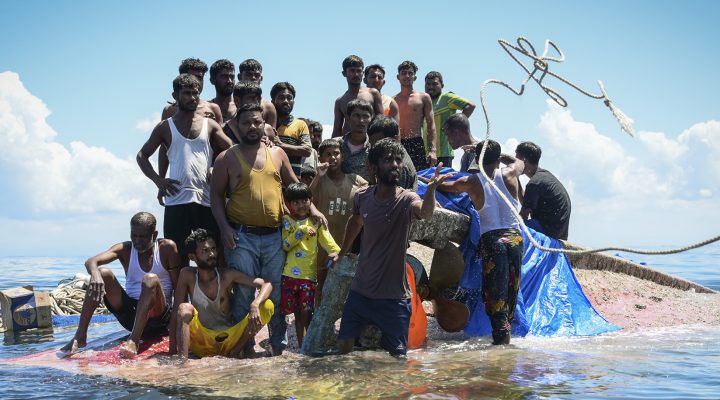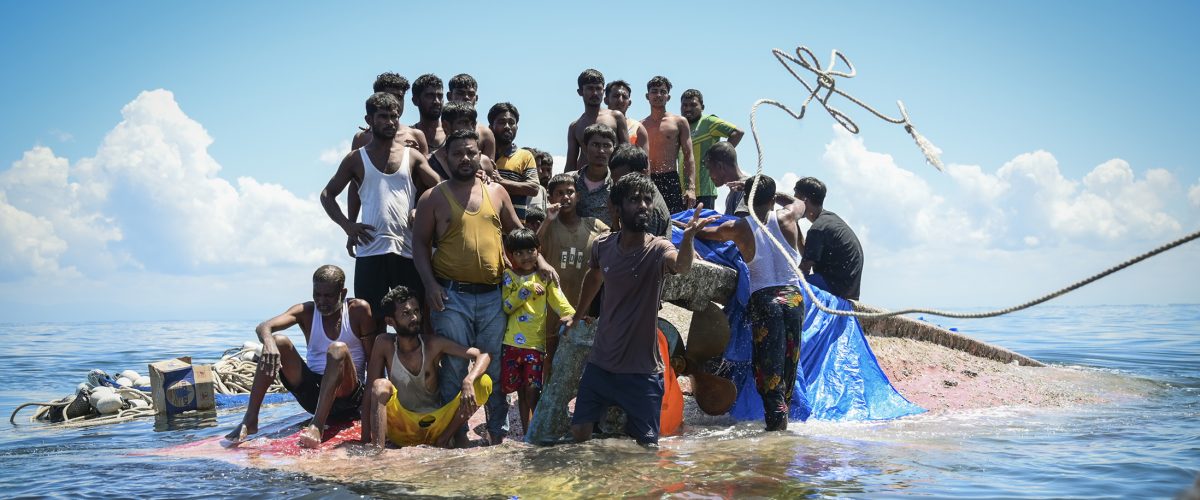no one leaves home unless
home is the mouth of a shark
you only run for the border
when you see the whole city running as well
your neighbors running faster than you
breath bloody in their throats
the boy you went to school with
who kissed you dizzy behind the old tin factory
is holding a gun bigger than his body
you only leave home
when home won’t let you stay.
“Home,” read by poet Warsan Shire
To mark World Refugee Day, I present to you this poem, “Home,” by British-Somali writer Warsan Shire. If you have human tears to shed, listen to her read the poem at the link above, and weep with her.

Warsan Shire (Photo by Amaal Said)
Shire herself is not a refugee, strictly speaking. But she’s the daughter of refugees who fled their blood-soaked homeland of Somalia, the prototypical failed state, for sanctuary in Kenya before her birth in 1988. When she was a year old, they emigrated to the United Kingdom. She now lives with her husband and children in Los Angeles. So she knows something about being a stranger in a strange land, about looking for home. Every immigrant does — especially refugees.
Shire also feels it in her very bones from the stories she’s heard from family members and friends, as she told an interviewer: “I grew up with a lot of horror in the backdrop — a lot of terrible things that have happened to people who are really close to me, and to my country, and to my parents. So it’s in the home and it’s even in you, it’s on your skin and it’s in your memories and your childhood. And my relatives and my friends and my mother’s friends have experienced things that you can’t imagine, and they’ve put on this jacket of resiliency and a dark humor. But you don’t know what they’ve been victims of, or what they’ve done to other people. Them being able to tell me, and then me writing it, it’s cathartic, being able to share their stories, even if it is something really terrible, something really tragic. Sometimes I’m telling other people’s stories to remove stigma and taboo, so that they don’t have to feel ashamed.”
no one leaves home unless home chases you
fire under feet
hot blood in your belly
it’s not something you ever thought of doing
until the blade burnt threats into
your neck
and even then you carried the anthem under
your breath
only tearing up your passport in an airport toilet
sobbing as each mouthful of paper
made it clear that you wouldn’t be going back.
Filippo Grandi, the United Nations High Commissioner for Refugees, reported May 30 that the number of people fleeing their homes because of war, violence and persecution has topped 114 million. The number keeps rising because the nations they flee from — and flee to — have failed to deal with the causes of conflict.
He sharply criticized members of the U.N Security Council, to their faces, about their inaction as conflicts drag on and combatants increasingly violate human rights and ignore the most basic laws of war. He cited war zones such as Syria, Congo, Sudan, Ukraine, Gaza and Myanmar.
“But it’s not too late to put your focus and energy on the crises and conflicts that remain unresolved, so that they are not allowed to fester and explode again,” he said. “It’s not too late to step up help for the millions who have been forcibly displaced to return home voluntarily, in safety and dignity.”
Until that time comes:
you have to understand,
that no one puts their children in a boat
unless the water is safer than the land
no one burns their palms
under trains
beneath carriages
no one spends days and nights in the stomach of a truck
feeding on newspaper unless the miles travelled
means something more than journey.
no one crawls under fences
no one wants to be beaten
pitied
no one chooses refugee camps
or strip searches where your
body is left aching
or prison,
because prison is safer
than a city of fire
and one prison guard
in the night
is better than a truckload
of men who look like your father
no one could take it
no one could stomach it
no one’s skin would be tough enough
Look, I understand your fear. I understand the fear of many countries, of our own country, as migrants surge across borders looking for a new home, a home where they won’t be shot, or beaten, or raped, or starved in camps. We can’t take them all. Europe can’t take them all. I understand why domestic politics over the issue have turned sharply nationalist and anti-immigrant.
“I understand why domestic politics over the issue have turned sharply nationalist and anti-immigrant.”
But we can take in more than we’re taking in now. We can help more start new homes. We can treat them like fellow human beings.
We can stop …
the
go home blacks
refugees
dirty immigrants
asylum seekers
sucking our country dry
niggers with their hands out
they smell strange
savage
messed up their country and now they want
to mess ours up
how do the words
the dirty looks
roll off your backs
maybe because the blow is softer
than a limb torn off
or the words are more tender
than fourteen men between
your legs
or the insults are easier
to swallow
than rubble
than bone
than your child’s body
in pieces.
I’ve never been a refugee. I don’t know what it feels like to be one. But I’ve looked into the eyes of thousands of refugees since the first wave of boat people came to America from Southeast Asia in the 1970s. I met Hmong people from Laos who resettled in my hometown of Atlanta and Vietnamese crowded onto military bases-turned-refugee camps in Oklahoma and Arkansas and Cambodians fresh from the killing fields struggling to learn English and find jobs in Denver.
Later, reporting on various stories overseas, I interviewed terrified civilians fleeing Iraq’s invasion of Kuwait; met Palestinians living in the permanent refugee camps of Gaza; listened to Afghans in Germany and Turkey fleeing the Taliban; drank tea with Syrian families on the run from civil war, crowded into dingy apartments and camps as big as cities in Jordan and Lebanon; quizzed Somalis living in London and the dangerous streets of “Little Mogadishu” in Nairobi.
Back home, I have done what I can to welcome the successive waves of refugees who have resettled in my home city of Richmond over the years — Afghans, Pakistanis, Sudanese, Burmese, Bhutanese Nepalis. Many others, especially refugee-sponsoring church folks, have done far more.
“You can see it in their eyes, which have seen things your eyes will never see.”
Every refugee is a different person, but in at least one way they’re all the same. You can see it in their eyes, which have seen things your eyes will never see. Their eyes ask, “Will you give me a hand? I didn’t want this; it was forced upon me. I have to survive and make a new home for my family. Could you help, just until I get on my feet, get a job and learn English?”
i want to go home,
but home is the mouth of a shark
home is the barrel of the gun
and no one would leave home
unless home chased you to the shore
unless home told you
to quicken your legs
leave your clothes behind
crawl through the desert
wade through the oceans
drown
save
be hungry
beg
forget pride
your survival is more important
no one leaves home until home is a sweaty voice in your ear
saying-
leave,
run away from me now
i don’t know what i’ve become
but i know that anywhere
is safer than here
Another poet, Bob Dylan, asked this question in a classic song about someone scuffling for survival on the streets: “How does it feel, how does it feel, to be on your own, no direction home, a complete unknown, like a rolling stone?”
You’ll never really know how it feels – unless you’ve been there. But you can help someone who’s been there make a new home.

Erich Bridges
Erich Bridges, a Baptist journalist for more than 40 years, has covered international stories and trends in many countries. He lives in Richmond, Va.


